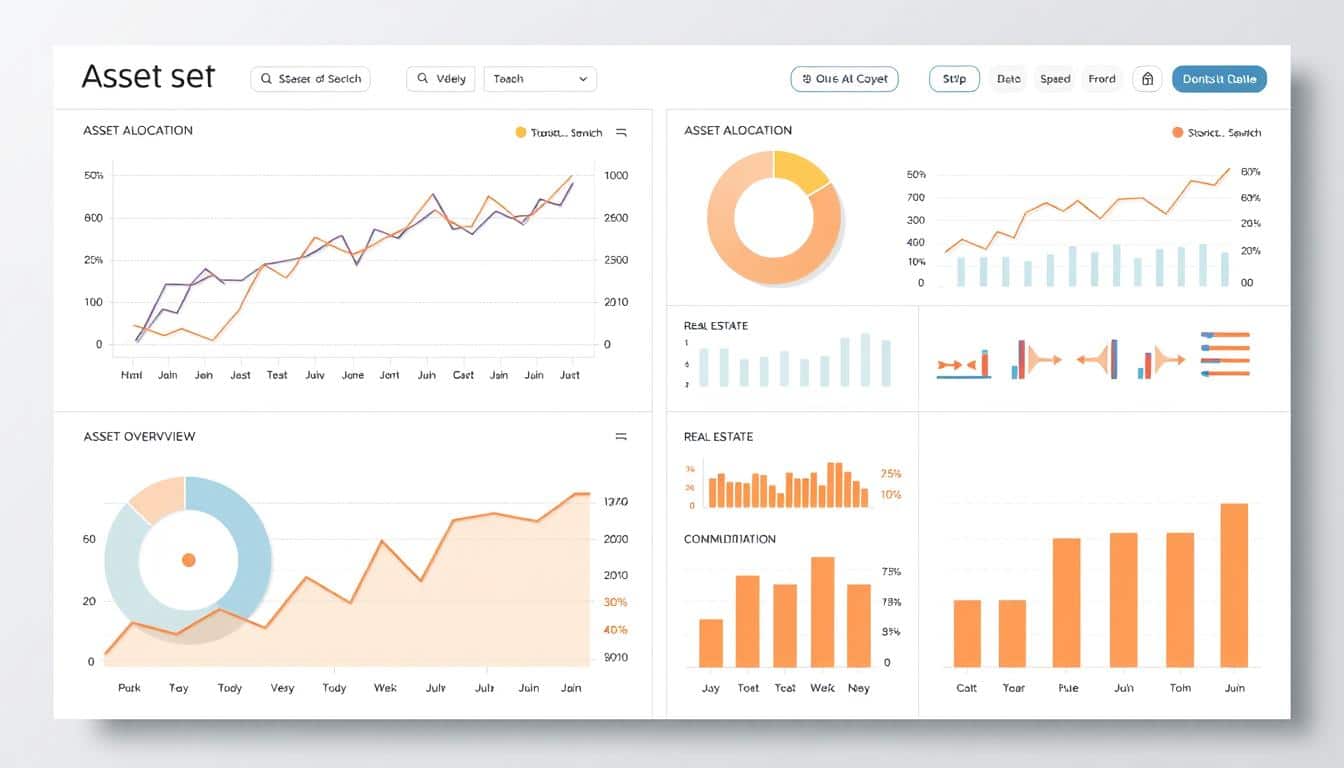Your credit score is super important for your money matters. Having a good score means you can get loans with less cost and easier approvals. In this article, we’ve got key tips and smart money moves to make your credit score better. Follow our expert advice to handle credit wisely and make your financial life stronger.
The Importance of Your Credit Score
Today, it’s vital to know about credit scores. They range from 300 to 850. A higher score means you’re good at handling credit. Understanding these scores helps people make smart money choices. This improves their financial life.
Anúncios
Credit scores are based on five main things. These are payment history, how much credit you use, how long you’ve had credit, the types of credit you have, and how often you apply for new credit.
Understanding Credit Scores
Credit scores are super important. They affect loans and interest rates. A high credit score means you can get lower rates on big purchases like homes and cars. But, a low score might limit your choices.
Your credit score shows how you handle money. It tells lenders if you’re likely to pay them back. So, taking care of your credit score is a must.
How Credit Scores Impact Your Financial Life
A good credit score helps in many ways. It means better credit card deals and easier time renting. It can even help you get a job. Lenders look at your score to decide if you’re a safe bet.
The higher your score, the better the terms you’ll get. This shows why a good credit score is key to reaching your financial goals.

Monitoring Your Payment History
Your payment history is the most important part of your credit score. Making payments on time can raise your score. Meanwhile, late or missed payments will lower your score. To keep a good credit score, make sure to pay on or before the due date. If you’re having trouble paying, talking to your lender right away can help avoid missed payments.
Setting up reminders for when your bills are due is a smart move. It helps you pay on time and keep your finances in order. Checking your credit reports often is also key. This lets you spot any errors or payments you might have missed needing to be fixed. By keeping an eye on these things, you can keep your credit score healthy and improve your financial well-being.
Using Credit Wisely
Understanding your credit utilization ratio is key for good credit health. It’s found by dividing your credit balance by your total credit limit. Aim to keep this ratio under 30% to keep your credit score strong. Being smart with credit shows you’re disciplined with your finances.
Credit Utilization Ratio Explained
Your credit utilization ratio shows lenders how well you handle credit. A lower ratio means you use credit wisely, not depending too much on loans. This makes you look better to lenders, helping you get better rates and easier loan approvals.
Tips for Keeping Your Credit Utilization Low
To improve your credit score, it’s smart to lower your credit utilization. Here are some tips:
- Ask for a higher limit without spending more.
- Pay down balances more often than just once a month.
- Keep your credit card spending low.
- Use a budget to watch your expenses closely.
By using these methods, you can take charge of your credit utilization ratio. This is a smart way to use credit to your advantage.
Improving Your Credit History
Understanding how to improve your credit history is key to a strong credit score. The age of your credit accounts is a big deal. A longer credit history tells lenders you’re good with credit over time. This can lead to better deals and a higher score.
The Significance of Length of Credit Accounts
Having credit accounts for a long time helps your score. A long credit history gives a full picture of how you manage money. It makes your credit utilization look good, showing you use credit smartly. It’s key to understand the value of old accounts for better credit.
Keeping Old Accounts Open
It’s important to keep old credit accounts open, even if you don’t use them much. Closing them can shorten your credit history and drop your score. By keeping these accounts open, you help keep your credit history long. Doing this helps improve your score and get better loan offers.
Limiting Credit Applications and Inquiries
Handling credit inquiries is key to keeping a good credit score. To make your score better, it’s important to know the difference between types of credit checks. This includes understanding hard hits versus soft hits. By choosing when and how to apply for credit wisely, you can guard your financial health.
Understanding Hard Hits vs. Soft Hits
There are two kinds of credit checks: hard hits and soft hits. Hard hits happen when you ask for new credit, like a credit card or loan. This can lower your score. Soft hits won’t affect your score. They usually happen for things like background checks or when you check your credit yourself.
The Impact of Multiple Credit Checks on Your Score
Applying for credit too often in a short time can add up. This might lower your score. To avoid this, try to group your credit applications together. This way, credit bureaus might see them as one single check. By doing this, you keep control of your score while dealing with credit applications more wisely.
Diversifying Your Credit
Building a good credit mix means having different types of credit accounts. This method makes your credit score better. It also shows you can handle various credit kinds wisely.
The Benefits of a Mixed Credit Portfolio
Having both revolving accounts (like credit cards) and installment loans (such as car loans or mortgages) can boost your credit score. This variety tells lenders you’re good with money. And, it comes with perks:
- Enhanced creditworthiness.
- Lower interest rates on future loans.
- Improved chances of getting approved when applying for new credit.
How to Safely Diversify Your Credit Products
Diversifying credit is smart, but be careful. Make sure you can pay back what you borrow. Here’s how to diversify safely:
- Check your finances to see what new credit you can afford.
- Balance different credit types without stretching your budget too thin.
- Start with a secured credit card or a small loan if you’re new to credit.
By doing this, you can create a strong credit mix. This shows you’re good at managing your money and can improve your score.
Strategies for Quick Credit Score Improvements
Knowing how mistakes on your credit report can hurt your money health is key. Such errors can lower your credit score a lot. The first move to quickly up your credit score is to watch your reports from Experian, TransUnion, and Equifax closely. Make sure they’re right, so you can fix any problems fast.
How Errors in Your Credit Report Affect Your Score
Credit report mistakes can include wrong account info, payment records, or stranger’s accounts. These errors can drop your score a lot, making it hard to get loans or causing you to pay more interest. Fixing them is crucial for your money’s health.
Steps to Take for Disputing Credit Report Errors
If errors pop up, act fast. Here are the steps to dispute them:
- Gather proof for your claim.
- Contact the credit bureau online or by mail.
- Explain the mistake clearly and give them your evidence.
- Stay on it if they’re slow to answer.
Using these steps can quickly better your credit score. This helps you reach your money goals easier.
Paying Your Bills on Time
Paying bills on time is key for a good credit score. It affects your financial health, giving you better rates and credit access. Using Autopay makes sure you don’t pay late, protecting your score.
The Power of Timely Payments on Your Credit Score
Timely payments are crucial for your credit score. Credit bureaus focus on your payment history to figure your score. Missing just one can hurt your credit a lot.
But, if you always pay on time, your score goes up. This makes lenders see you as a good candidate for loans.
Setting Up Autopay and Reminders
Autopay makes managing finances easier. It ensures the minimum is paid each month on time. This way, you don’t forget and face penalties.
Reminders from banking apps or calendars also help. They keep you on track to avoid late fees and a drop in your score. This keeps your credit in good shape.
Understanding Credit Utilization
Your credit utilization ratio is key to your credit score. It shows how much credit you use versus what you have. Keeping a good credit utilization ratio (CUR) is critical for loans and your financial wellbeing. Learning to calculate your CUR helps you manage your credit wisely.
Calculating Your Credit Utilization Ratio
Figuring out your credit utilization ratio is simple. Just divide what you owe on your cards by your total credit limit. This math will show you the percentage of credit you’re using. If your limit is $5,000 and you owe $1,500, your CUR is 30%. It’s best to keep your CUR under 30% for a solid credit standing.
Ways to Reduce Credit Utilization
Lowering your credit utilization can boost your credit score. Here’s how:
- Ask for higher limits from your card company to up your available credit.
- Pay down balances multiple times a month to drop what you owe.
- Avoid charging non-essential items to your cards.
- Think about consolidating debt for better balance management.
These steps will help cut your credit utilization and improve your financial health.
The Role of Credit Mix in Your Score
The importance of credit mix cannot be overstated for those aiming at a balanced credit profile. Credit mix means the various types of credit you have, which might include installment loans, like auto loans, and revolving credit, such as credit cards. A diverse credit mix is a plus in the eyes of scoring agencies and can boost your score.
What is Credit Mix and Why It Matters
A strong credit mix is vital for a good credit score. It proves to lenders that you’re able to handle different credit types well. This boosts how creditworthy you appear. It’s essential to keep a good balance between your revolving and installment accounts to show you can manage varied financial tasks.
How to Achieve a Balanced Credit Mix
To get a balanced credit mix, follow these steps:
- Open a credit card account if you only have installment loans.
- Explore personal loans or home equity loans if you mainly use credit cards.
- Don’t let your debt get out of control as it can hurt your score.
- Keep an eye on your credit use and payment history to keep accounts healthy.
By smartly diversifying your credit, you enhance your chances for balanced credit. This is good for your score.
Conclusion
Improving your credit score involves many steps. It’s important to make payments on time, keep an eye on how much credit you use, and have different types of credit. These steps build a strong base for better credit over time.
Knowing the details of your credit report is also key. Keeping old accounts open and fixing mistakes on your report can really help. By using these tips, you’ll open doors to new financial opportunities.
Remember to be patient and consistent. If you use these strategies well, your financial health will improve for the better. Your credit score is a big part of your money journey. Starting now will lead you to success.
FAQ
What is a credit score and why is it important?
How can I improve my credit score?
What factors contribute to my credit score?
How does payment history affect my credit score?
What is a credit utilization ratio?
How can I lower my credit utilization ratio?
Why should I keep older credit accounts open?
What are hard hits and soft hits in credit inquiries?
How can I diversify my credit portfolio safely?
How do errors in my credit report affect my score?
What are the benefits of setting up Autopay?
How can I calculate my credit utilization ratio?
What does a balanced credit mix mean?
Content created with the help of Artificial Intelligence.



